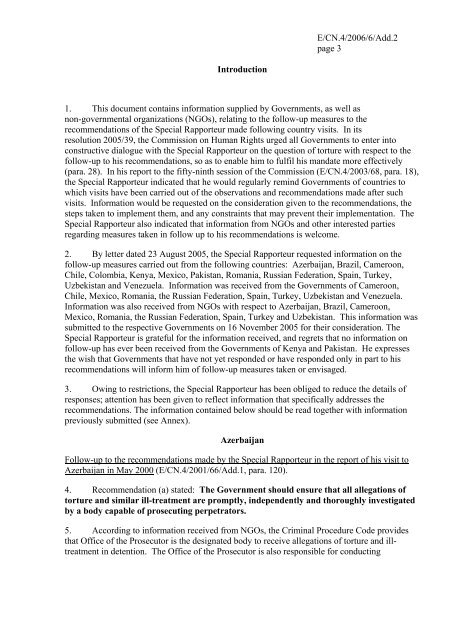E Economic and Social Council - acnudh
E Economic and Social Council - acnudh
E Economic and Social Council - acnudh
You also want an ePaper? Increase the reach of your titles
YUMPU automatically turns print PDFs into web optimized ePapers that Google loves.
Introduction<br />
E/CN.4/2006/6/Add.2<br />
page 3<br />
1. This document contains information supplied by Governments, as well as<br />
non-governmental organizations (NGOs), relating to the follow-up measures to the<br />
recommendations of the Special Rapporteur made following country visits. In its<br />
resolution 2005/39, the Commission on Human Rights urged all Governments to enter into<br />
constructive dialogue with the Special Rapporteur on the question of torture with respect to the<br />
follow-up to his recommendations, so as to enable him to fulfil his m<strong>and</strong>ate more effectively<br />
(para. 28). In his report to the fifty-ninth session of the Commission (E/CN.4/2003/68, para. 18),<br />
the Special Rapporteur indicated that he would regularly remind Governments of countries to<br />
which visits have been carried out of the observations <strong>and</strong> recommendations made after such<br />
visits. Information would be requested on the consideration given to the recommendations, the<br />
steps taken to implement them, <strong>and</strong> any constraints that may prevent their implementation. The<br />
Special Rapporteur also indicated that information from NGOs <strong>and</strong> other interested parties<br />
regarding measures taken in follow up to his recommendations is welcome.<br />
2. By letter dated 23 August 2005, the Special Rapporteur requested information on the<br />
follow-up measures carried out from the following countries: Azerbaijan, Brazil, Cameroon,<br />
Chile, Colombia, Kenya, Mexico, Pakistan, Romania, Russian Federation, Spain, Turkey,<br />
Uzbekistan <strong>and</strong> Venezuela. Information was received from the Governments of Cameroon,<br />
Chile, Mexico, Romania, the Russian Federation, Spain, Turkey, Uzbekistan <strong>and</strong> Venezuela.<br />
Information was also received from NGOs with respect to Azerbaijan, Brazil, Cameroon,<br />
Mexico, Romania, the Russian Federation, Spain, Turkey <strong>and</strong> Uzbekistan. This information was<br />
submitted to the respective Governments on 16 November 2005 for their consideration. The<br />
Special Rapporteur is grateful for the information received, <strong>and</strong> regrets that no information on<br />
follow-up has ever been received from the Governments of Kenya <strong>and</strong> Pakistan. He expresses<br />
the wish that Governments that have not yet responded or have responded only in part to his<br />
recommendations will inform him of follow-up measures taken or envisaged.<br />
3. Owing to restrictions, the Special Rapporteur has been obliged to reduce the details of<br />
responses; attention has been given to reflect information that specifically addresses the<br />
recommendations. The information contained below should be read together with information<br />
previously submitted (see Annex).<br />
Azerbaijan<br />
Follow-up to the recommendations made by the Special Rapporteur in the report of his visit to<br />
Azerbaijan in May 2000 (E/CN.4/2001/66/Add.1, para. 120).<br />
4. Recommendation (a) stated: The Government should ensure that all allegations of<br />
torture <strong>and</strong> similar ill-treatment are promptly, independently <strong>and</strong> thoroughly investigated<br />
by a body capable of prosecuting perpetrators.<br />
5. According to information received from NGOs, the Criminal Procedure Code provides<br />
that Office of the Prosecutor is the designated body to receive allegations of torture <strong>and</strong> illtreatment<br />
in detention. The Office of the Prosecutor is also responsible for conducting
















